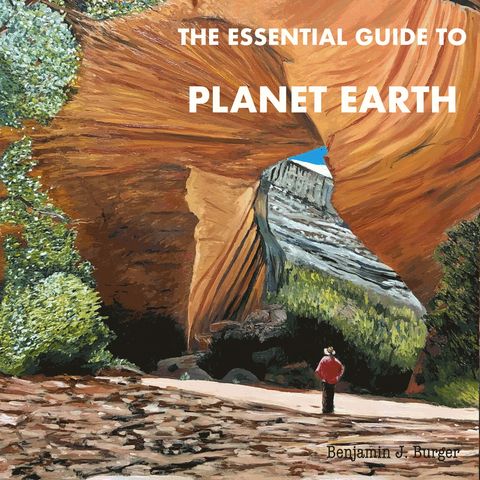Introduction to The Essential Guide to Planet Earth

Scarica e ascolta ovunque
Scarica i tuoi episodi preferiti e goditi l'ascolto, ovunque tu sia! Iscriviti o accedi ora per ascoltare offline.
Descrizione
Every moment of your life will be from the perspective of a single planet—Planet Earth. You were born here and you will die here. This textbook is a guide to...
mostra di piùThis textbook is written for an audience of introductory college students in a nonscience degree program. It is intended to provide a detailed comprehensive knowledge of Planet Earth, including basic aspects of physics, chemistry, geology, and biology. As a major scientific overview of the entirety of planet Earth, the intention is to only present key concepts that will enhance, enrich, and engage the readers interest in Earth sciences. It is intended to make any reader, such as yourself, at least a little more knowledgeable of the amazing place that we all live within.
All of the text and modules of the Planet Earth course are offered under a Creative Commons with Attributions license, which means that you are free to share and redistribute the material in any medium or format, and to adapt remix, transform, and build upon the material for any purpose, even commercially. Just be sure to attribute the text with the author's name and course name, and indicate where you found the information. The purpose of making this text free to disseminate is that it contains valuable information that you should feel free to share and discuss as widely as possible. Science adapts to new knowledge, and as such this text can be updated and modified as new discoveries are made. An open text also ensures that the knowledge remains affordable to the average student, such as yourself. Feel free to pass on the information that you learn in this course and you are free to make printed copies. The referenced text is available as a Wikibook on the Wikipedia website.
About the Author
Benjamin J. Burger is a geologist who earned his masters of science degree in 1999 at Stony Brook University in New York and his Doctorate in 2009 at the University of Colorado in Boulder, and he spent five years working at the American Museum of Natural History in New York City. He has also worked as a professional geologist in the states of Utah, Colorado, and Wyoming. He joined the Utah State University faculty in 2011 and continues to teach and conduct research as an Associate Professor in the Department of Geoscience at the Uintah Basin – Vernal Campus of Utah State University located in northeastern corner of Utah. Many of his course lectures and educational content can be found on YouTube or on his website at www.benjamin-burger.org
About this textbook
This book was written with the support of a grant offered by Utah State University Libraries, Academic & Instructional Services, and the College of Science to support faculty and instructors at Utah State University Statewide Campuses to create Open Educational Resources to support their online courses in the United States of America. These grants are made to reduce barriers to student success as well as to encourage faculty and instructors to try new, high-quality, and lower-cost ways to deliver learning materials to students through Open Educational Resources.
The majority of the first edition of the textbook was written between 2019 and 2020 with the intention that the textbook would be offered free of charge to all participants in GEO 1360 Planet Earth, an online course offered at Utah State University. This textbook is offered for any faculty, instructor, or teacher to adopt for their own courses they teach, and it is distributed under a Creative Commons License. If you notice any errors or mistakes, please contact the author.
Digging Deeper
Hyperlinks will be referenced throughout the text to encourage further reading on any particular topic, most of these will point toward a Wikipedia article or an original scientific publication. These referenced resources will follow a similar style and format as seen on the popular Wikipedia website, where sources of specific information can be referenced and verified with a simple link. Every attempt was made to ensure the external links that you will find within the modules are verified in print and online sources, including peer-reviewed scientific papers, publications of scientific societies, government organizations, and mainstream news organizations. There is no guarantee these external links will remain available online or whether they will be archived for future electronic access. Furthermore, there is no guarantee that your university or college will have a subscription to the article to view online. However, most of these external references should be accessible to you if you wish to explore a topic more in-depth than provided in the text, especially many of the Wikipedia entries. Only information covered within the text of this course will be used on quizzes and exams, as the reference hyperlinks serve to support statements and data within the main body of this course. You are not responsible for information that exists outside of this course on external webpages.
Vocabulary and Glossary of Terms
Important scientific terms will be in bold print and may have a hyperlink to a clear definition of that term. These terms should be defined in your notes, as they will likely be referenced in quiz and exam questions. Use of flashcards with the term and its definition might be an important study tool for the exams.
This podcast will be released episodically and follow the sections of the textbook in the description for more info we encourage you visit https://en.wikibooks.org/wiki/Planet_Earth
Voice by voicemaker.in
This was produced by Brandon Casturo
Planet Earth. (2022, August 10). Wikibooks, The Free Textbook Project. Retrieved 16:27, August 30, 2022 from https://en.wikibooks.org/w/index.php?title=Planet_Earth&oldid=4090021.
Informazioni
| Autore | Miranda Casturo |
| Organizzazione | Miranda Casturo |
| Sito | - |
| Tag |
Copyright 2024 - Spreaker Inc. an iHeartMedia Company

Commenti